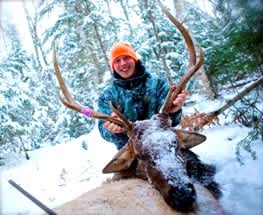A Successful Michigan Elk Season, in More Ways Than One

Michigan’s 2013 elk hunting season that just wrapped up was a successful season all-around. While hunters walked away with an experience they’ll never forget, Department of Natural Resources (DNR) staff members are happy management goals were met, both safely and legally.
“We manage elk in Michigan by hunting,” said area wildlife biologist Jennifer Kleitch. “Our seasons are very specific. We have certain hunting areas, dates and quotas, and we are very deliberate in order to maintain a healthy elk herd in balance with the available habitat.”
The early elk season, which is held in late August and September, has three separate hunt periods totaling 12 days of elk hunting. One hundred lucky hunters were drawn in the weighted elk lottery to hunt this period, and a total of 78 elk were harvested – 34 bulls and 44 cows.
The late elk season ran from Dec. 7-15, and another 100 hunters were able to hunt with great success. Hunters harvested 93 elk, and all those with bull licenses were successful.
Elk have come a long way in Michigan. From disappearing in the late 1800s due to the need for food and hides, to today with elk numbers being maintained in the northeast Lower Peninsula. Due to habitat management, laws regulating the take of elk and increased protection by DNR conservation officers, the elk population is now healthy and stable.
“Elk are important to the entire state of Michigan; folks come from all around to view them in their natural places,” said Doug Doherty of the Rocky Mountain Elk Foundation. “For many northern Michigan towns and businesses, elk viewing and hunting are a huge part of their livelihood.”
Over 32,000 resident hunters apply annually for a chance at harvesting a majestic Michigan elk, and hunters play a key role in balancing biological and social goals for the elk herd. The ideal goal for elk numbers in Michigan is 500 to 900.
“Where the elk actually are and their impacts on habitat are the biggest concerns in elk management,” said Kleitch. “Our hunts are used to help keep elk in large blocks of public land to reduce conflicts on agricultural and private lands.”
To learn more, visit www.michigan.gov/elk.
Hunters can increase their odds at drawing an elk license by applying for the Pure Michigan Hunt. The deadline to apply is Dec. 31, 2013. Three hunters will win a prize package valued over $4,000. Go to www.michigan.gov/puremichiganhunt to apply or for more information.

